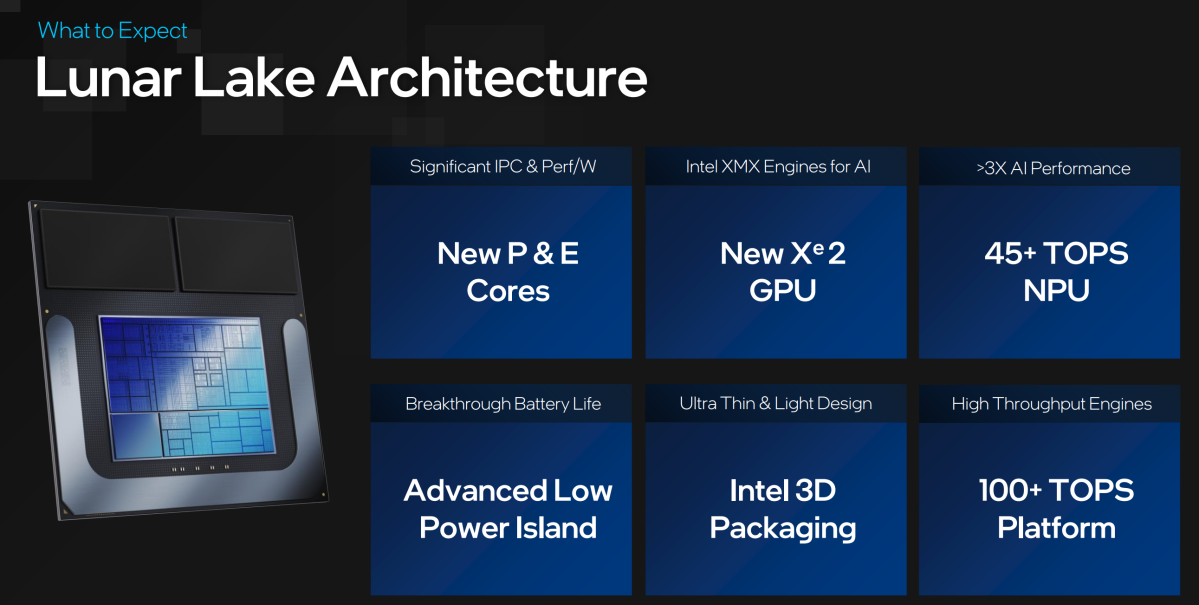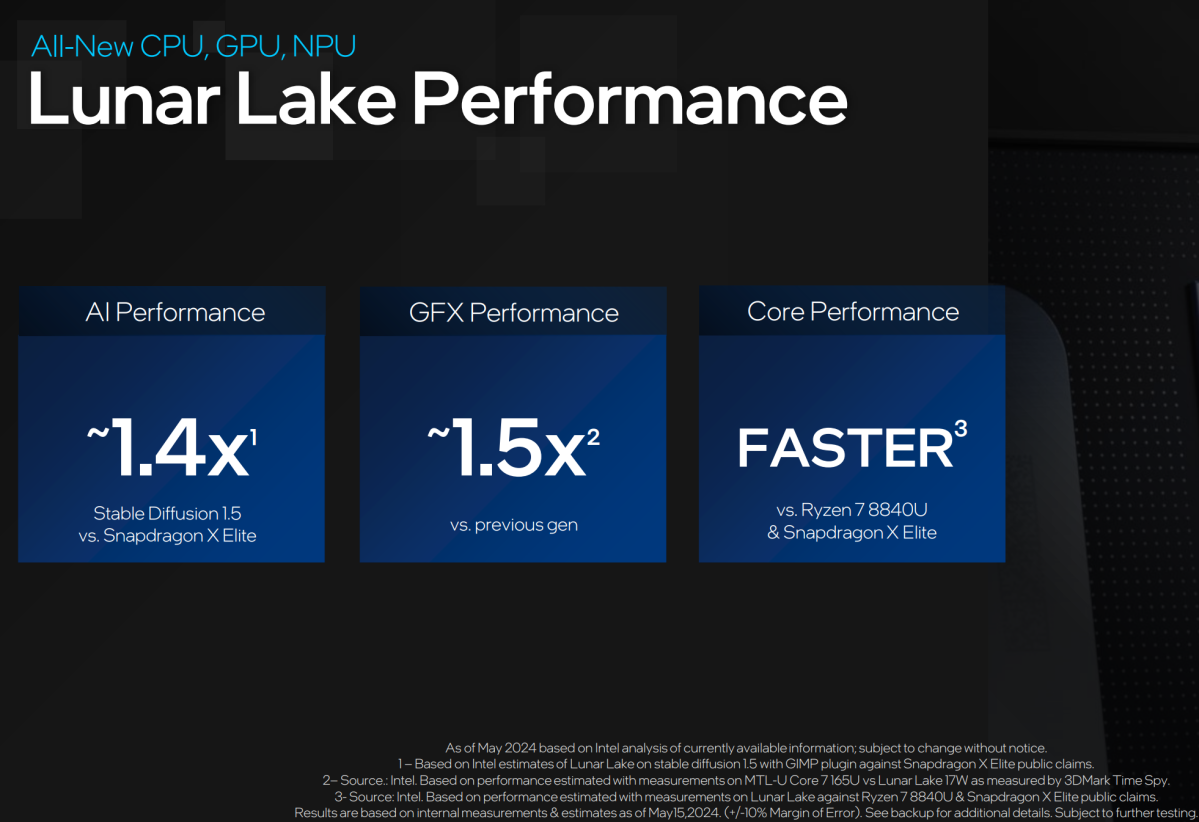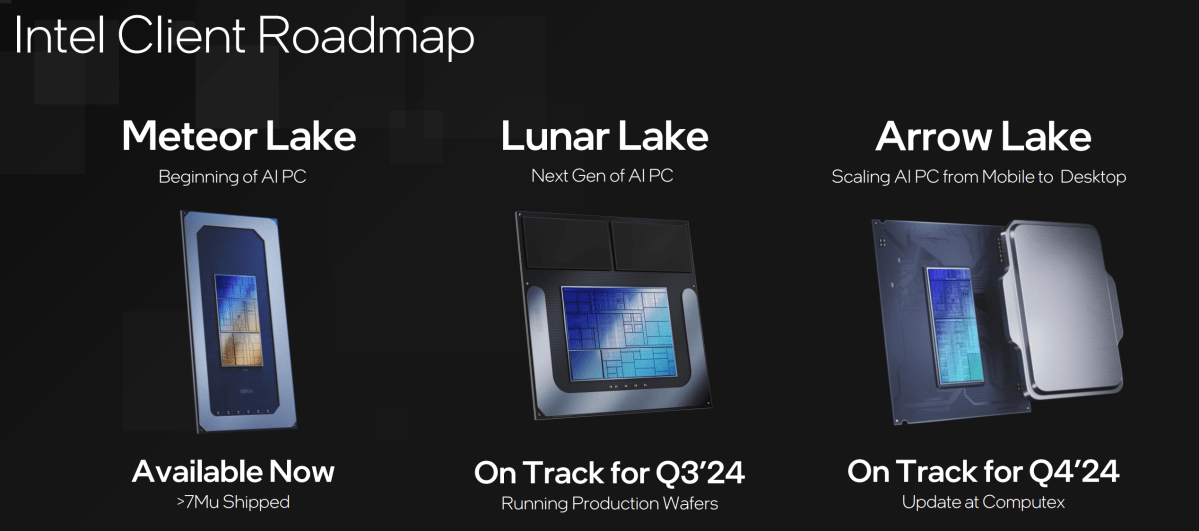Today might be the coming-out party for Qualcomm’s Snapdragon X Elite chips and a sizeable number of laptop partners, but Intel wants to remind you that it will reveal its next-gen Core Ultra mobile chips, code-named “Lunar Lake,” in roughly a week’s time.
Intel executives, in what was clearly an effort to distract from the launch of a number of PCs powered by the Qualcomm Snapdragon X Elite, said that Lunar Lake is currently in production and is on track to ship in the third quarter. Intel’s next desktop processor, “Arrow Lake,” is on track to ship during the fourth quarter of 2024.
Microsoft launched its Surface Pro 10 and Surface Laptop 6 with Snapdragon X Elite chips inside at a launch in Redmond, Wash., alongside several laptop vendors using Qualcomm’s chip running on Windows on Arm, including Lenovo, Dell, and Acer.
In response, Intel executives added to what we already know about Lunar Lake on Monday. What’s new? Lunar Lake will include new “Lion Cove” performance cores (“P-cores”) as well as new “Skymont” efficiency (“E-cores,”) both with “significant IPC [instructions-per-clock, or performance] improvements,” said Dan Rogers, general manager of the Client Performance Marketing Lab at Intel, in a briefing with reporters.

Intel
Intel also confirmed that Lunar Lake will include the Xe2 GPU, also known as “Battlemage,” which will debut on Lunar Lake before it appears in discrete GPUs. The core should deliver 1.5 times the performance of the previous generation, executives said.
Finally, the NPU will scale to above 45 TOPS, with total TOPS (GPU+CPU+NPU) scaling above 100 TOPS, with 60 TOPS coming from the GPU alone. Intel is building in Xe Matrix Extensions (XMX) into the NPU to improve AI acceleration, added Robert Hallock, Intel vice president and general manager of client AI and technical marketing.
We’ve known for a while that Lunar Lake will prioritize low power, the same emphasis Intel pinned to Meteor Lake. “We’ve reworked all of the IPs [logic blocks] for power efficiency and performance per watt,” Rogers said.
Intel has said before that Lunar Lake will be the first 18A (angstrom) chip. In 2022, Intel executives told the Hot Chips conference that Lunar Lake would be optimized for ultraportables running at 15 watts and below. And Lunar Lake has already publicly appeared in a handheld PC that will be shown off at next week’s Computex show in Taiwan.
“I want to call out a big goal for Lunar Lake is not just sizing up [increasing] all of the performance engines, but also doing that while advancing battery life in the biggest way that we’ve done in X86 architecture,” Rogers said.
That, of course, is likely an indirect reference to the all-day battery life Qualcomm Snapdragon X Elite PCs will offer. Lunar Lake will include an “advanced” low-power island and Intel’s 3D packaging, executives said.

Intel
Intel executives also released some early performance estimates, but they should be taken with an even larger chunk of salt than usual. In Stable Diffusion 1.4’s AI art generator, Intel claims that an undisclosed Lunar Lake chip will outperform a Snapdragon X Elite by 1.4 times, and that its core performance will be “faster” than both the Ryzen 7 8840U and the Snapdragon X Elite as well. Intel is also saying that in a 3×3 Microsoft Teams call, Lunar Lake will consume up to 30 percent less power than a Ryzen 7840U and up to 20 percent less than an older Qualcomm Snapdragon 8cx Gen 3.
However, Intel’s fine print claims that some of these claims are “estimates” and measurements compared against public claims by its competitors, and that they are “subject to further testing.”
Intel’s desktop chip, Arrow Lake, is coming later
Remember, Intel’s 2024 has been dominated by two different mobile chips, Meteor Lake as well as Lunar Lake — part of Intel’s forced march to catch up from the stalled 14nm process that persisted through Intel’s 11th-gen Core platform in 2021. Intel is expected to talk about Lunar Lake, which should be formally named the Core Ultra Series 2, in more detail at the Computex show in Taiwan. There, Intel may provide an update about Arrow Lake — the desktop chip it talked about at CES — as well. But it sounds like Computex will be, from Intel’s perspective, heavily dominated by Lunar Lake.
So far, Intel executives professed themselves pleased with how Intel has fared in the AI PC generation. Intel has shipped 7 million units of Meteor Lake chips to date.
“When we crossed the 5 million threshold…that number of units was equal to entire output of our competitors in 2023 in the entire PC space,” Hallock said. “So we’re moving hard and fast on the hardware, but we’ve got to back that up with the software.”

Intel
Last fall, Intel launched an AI acceleration program, aiming to get software developers writing for Intel’s hardware. Again, it’s a bid to capture the AI market, this time in software. Hallock said that Intel has worked with McAfee to move deepfake detection to the NPU. It has also been able to run LLMs, or AI chatbots, in both English and Chinese on the Core Ultra, and that it would be showing off Microsoft’s new Phi-3-mini model on the Core Ultra, too. The latter is a “small language model” (SLM), which is expected to run locally on a PC.
“We have more models, frameworks runtimes and applications running than our competitors and we think this sets us up very nicely to deliver a robust and rich experience,” Hallock said.




